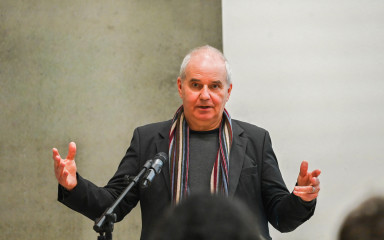11 Nov, 2025, 17:00Auditorium, HCU
Prof. Dr. Markus Hesse (University of Luxembourg)
Situating planning in conflict, or ‘planning in politics’

Image © Anastasija Lösslein.
Abstract
My talk will examine planning as an activity for the public good that is fundamentally political and deeply rooted in policy-making and public administration institutions. The aim is to consider conflict in the context of planning, and how planning can address polarized situations. In light of the growing complexity of public dissent and populist momentum, it can be argued that planning faces significant challenges. First, I claim that the consensus-seeking, apparently conflict-avoiding approach that planning has pursued in past decades is no longer sufficient to address these challenges, as that approach strips official plans and policies of their political content. Second, I contend that planning must reclaim its political nature and avoid post-politicization. One possible response to this challenge, then, lies in re-examining the principles of ‘collaborative planning’ (Healey, 1997). This must not be confused with, or reduced to, communicative planning. Rather, it is about ‘planning in politics’. In this context, I propose taking a closer look at the professional institutions that prepare and ultimately implement planning decisions: politics and administration. Their ability to successfully deal with conflict is essential for achieving effective planning outcomes, both now and in the future. Planning scholars should focus on conducting plan analysis and evaluation, as well as policy analysis.
Bio
Markus Hesse is a senior professor at the University of Luxembourg, Department of Geography and Spatial Planning (DGEO). He holds academic degrees in geography (Diploma), spatial planning (PhD), and human geography (postdoctoral). His research and teaching topics include urban geography (in particular, sub-/urbanization, metropolitan regions, ‘office towns’), economic geography (tertiarization and financial centres, logistics in spatial contexts), and spatial planning and governance. His current focus is on problems at the interface between science and practice, particularly in the context of sustainability transformation and transition strategies. He is a fellow of the Royal Geographical Society (RGS) of the UK. In 2005 he was elected as member of the Academy for Territorial Development in the Leibniz Association (ARL) in Germany. Since 1 January 2025, he has been vice president of the ARL.
More information
References:
Hesse, M. and M. Kühn (2023) Planungskonflikte in der pluralistischen Demokratie. Raumforschung und Raumordnung, 81(5), 422–36.